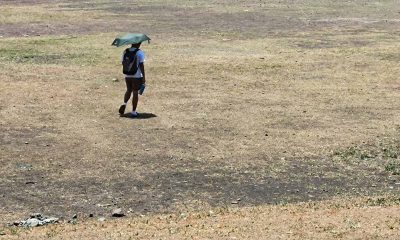News
Poachers target Africa’s lions, vultures with poison

This month, a continent-wide database was launched to gather data on wildlife poisoning and better understand a phenomenon that has been widely documented in southern Africa, where a reported 70 lions have been fatally poisoned in the last 18 months, according to managers. While the African Wildlife Poisoning Database lacks records from underreported areas including Central Africa, it dates to 1961 and lists nearly 300 poisoning incidents in 15 African countries that killed more than 8,000 animals from dozens of species, including leopards, hyenas, impalas, cranes and storks. (PIXABAY Photo)
JOHANNESBURG – Hundreds of vultures in Namibia died after feeding on an elephant carcass that poachers had poisoned. Poachers in Zimbabwe used cyanide to kill dozens of elephants for their ivory tusks. In Mozambique three lions died after eating bait infused with a crop pesticide.
Poisoning Africa’s wildlife is an old practice, but conservationists fear such incidents are escalating in some areas, saying relatively easy access to agricultural chemicals and the surging illegal market for animal parts are increasing pressure on a number of already beleaguered species. The threat is compounded by the indiscriminate nature of killing with poison, in which a single contaminated carcass can take down a range of animals, particularly scavengers such as vultures.
This month, a continent-wide database was launched to gather data on wildlife poisoning and better understand a phenomenon that has been widely documented in southern Africa, where a reported 70 lions have been fatally poisoned in the last 18 months, according to managers. While the African Wildlife Poisoning Database lacks records from underreported areas including Central Africa, it dates to 1961 and lists nearly 300 poisoning incidents in 15 African countries that killed more than 8,000 animals from dozens of species, including leopards, hyenas, impalas, cranes and storks.
“It’s still a big work in progress,” said Darcy Ogada, a Kenya-based database co-ordinator and assistant director of Africa programs at The Peregrine Fund, a conservation group. The goal, Ogada said, is to get governments to pay more attention to the “underground world” of wildlife poisoning that also threatens livestock, water sources and people who eat meat from birds and other poisoned animals.
Poachers with guns have killed hundreds of thousands of elephants and thousands of rhinos in Africa in past years, but wildlife traffickers have increasingly laced carcasses with poison to target vultures that circle overhead and can draw the attention of anti-poaching rangers. Previously, poisons such as strychnine were primarily used by farmers to kill jackals, wild dogs and other predators that attack livestock, though some landowners and communities have responded positively to anti-poison campaigns.
In 2013, between 400 and 600 vultures died after feeding on the poisoned carcass of an elephant that was killed for its ivory in Namibia’s Zambezi area, said Andre Botha, a poisoning database manager and special projects manager at the Endangered Wildlife Trust, a South African group.
“This is the highest number of vultures killed in a single poisoning incident that we have on the database to date,” Botha said.
Some of Africa’s species of vulture, whose body parts are also precious in traditional medicine in parts of the continent, are listed as critically endangered. South Asian vulture populations are a fraction of what they were, largely because of feeding on carcasses of livestock treated with diclofenac, a veterinary drug that is toxic to vultures. Government bans on the drug, however, helped level those declines.
African lions are in peril partly because of human encroachment on habitats and the poaching of animals for food, which deprives lions of prey. The killing of lions by poison, once largely a result of livestock owners trying to protect their herds, appears to reflect growing local and Asian demand for lion claws, bones and other parts used in traditional medicine, according to Botha.
“What we see now is people purposely going out and targeting lions,” he said. Some 70 were poisoned in southern Africa since last year, Botha said. The database reports a total of 51 lion poisonings between 1980 and 2015.
In July, officials in Mozambique’s Limpopo National Park on the border with South Africa found poacher tracks, bait laced with poison, and the carcasses of three lions and a hyena, according to the Peace Parks Foundation, which develops cross-border conservation areas. It said authorities believe poachers used a substance containing the pesticide aldicarb, which South Africa banned because of its environmental threat.
Another pesticide, carbofuran, is the “abused product of choice” in countries including Botswana, Tanzania and Kenya, said Tim Snow, a South African conservationist who helps train southern African rangers in how to deal with poisoning sites by wearing surgical gloves for their own safety and collecting samples for study in a laboratory.
He said poachers in Zimbabwe have killed more than 90 elephants since 2015 by poisoning water sources with cyanide, a chemical used to extract gold from ore. Authorities have seized cyanide stashes from vehicles at police roadblocks and a warehouse in Bulawayo city, Snow said.
Educating communities about the environmental fallout from poisoning wildlife is key, said Mark Anderson, CEO of BirdLife South Africa. Banning poisons, he said, has a limited impact because “there’s an unlimited supply and variety of poisons that can be used.”





















